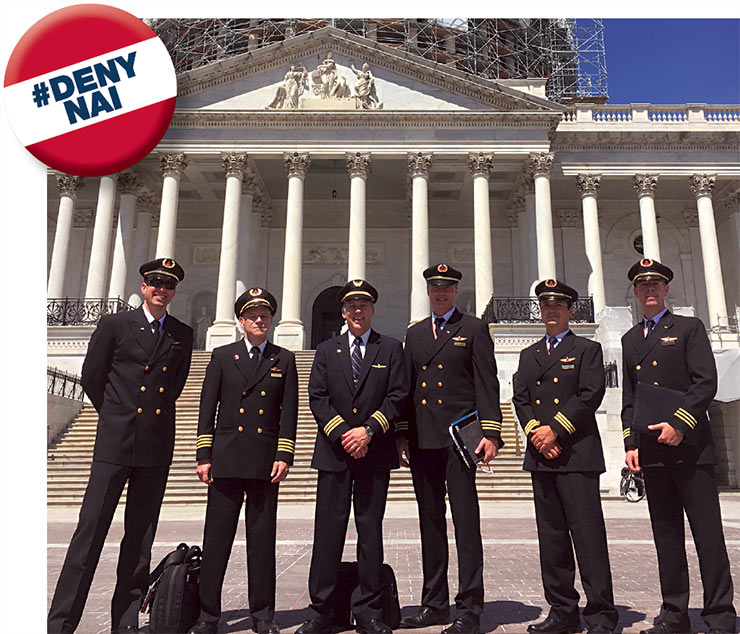ALPA Members Lobby for Pilot-Partisan Agenda on Capitol Hill
Pilots Urge Members of Congress to Deny NAI
By John Perkinson, Senior Staff Writer

From left, F/O Ryan Breznau (Delta), Capt. Jud Crane (Delta), F/O Doug Mattson (United), F/O Scott Jones (Delta), F/O J.C. Freese (Delta), and F/O Weston Sewall (Delta) in front of the U.S. Capitol.
Nearly 150 ALPA pilots were in Washington, D.C., on June 14, educating Members of Congress and their staff about the dangerous precedent that could be set by allowing Norwegian Air International (NAI) to fly to the United States. Scores of pilots from 30 different states met with their elected representatives to discuss the U.S. Department of Transportation’s (DOT) tentative approval in April of a foreign air carrier permit for the airline—a decision that violates key language in the U.S.–EU Air Transport Agreement (ATA).
These congressional office visits were the culmination of the three-day ALPA Government Affairs Legislative Summit, an annual conference that provides pilot representatives with the tools they need to be effective pilot-partisan advocates. The pilot reps then apply what they’ve learned, meeting with lawmakers to lobby for policies that promote both the U.S. airline industry and the airline piloting profession.
Airline industry game changer
During his opening remarks to summit attendees, Capt. Tim Canoll, ALPA’s president, said about NAI, “It’s up to all of us to convince our elected leaders that, as the men and women who live in the communities and vote for them, our jobs and our futures are at stake.” He added, “Make no mistake, the facts are on our side. It’s our duty, your duty, this week, to share our stories, open the eyes of Congress to what is sound governance.”
The summit reinforced to participants that at issue in the NAI decision is Article 17 bis of the ATA, a provision that calls for maintaining labor standards where NAI is based. Wholly owned by Norwegian Air Shuttle (NAS), NAI operates under an Irish operating certificate, with flight crews provided by a Singapore employment company using individual contracts with compensation substantially below that of NAS’s Norway-based employees—actions that are illegal under Norwegian law. NAS already has approval from the DOT to fly to the United States.
“The precedent here could be a game changer for the airline industry worldwide,” said Zack Mooneyham, a manager in ALPA’s Government Affairs Department, noting that if NAI is permitted to violate the labor provision, other airlines will undoubtedly follow suit. During his presentation, Mooneyham asserted, “If you’re not following the terms of the agreement, you’re breaking the law.”
Rep. Rick Larsen (D-Wash.), a senior member of the U.S. House Transportation and Infrastructure Committee, spoke to attendees about H.R. 5090. The legislation, of which Larsen is the lead sponsor, would direct the DOT to require that it evaluate whether European airlines meet the labor standards of the ATA before allowing them to fly to the United States. Larsen noted that support for the bill has been building in the House, yet the Senate still needs to act on the legislation.
Hill meetings
During the summit, participants also heard from Capitol Hill insiders about how Washington works. Judy Schneider, a congressional specialist from the Brookings Institution, offered a behind-the-scenes civics lesson, explaining the nuances of federal policy-making. She noted that when speaking with House members, pilots should “make it personal. [Politicians] lose elections when they forget where they come from.”
A panel of seasoned congressional staffers talked about meeting with Members of Congress. Jack Ruddy, the legislative director for Rep. Sam Graves (R-Mo.), reminded pilots to “make the ‘ask.’ We need to know what you’re asking us to do.” Also on the panel were Nora Todd, a senior policy advisor for Sen. Sherrod Brown (D-Ohio), and Kwabena Nsiah, a policy advisor to the U.S. House of Representatives Democratic Caucus.
Vanessa Kermick, ALPA’s grassroots coordinator, noted that when meeting with a legislator pilots should include “the introduction, the education, the ask, and the follow-up.” She also discussed contacting Members of Congress at their home offices through ALPA’s District Advocacy program and the value of using social media to reinforce ALPA’s message.
Brian Heenan, the Association’s ALPA-PAC coordinator, talked about ALPA’s PAC, telling attendees it’s “the most bipartisan labor PAC in the country.” He noted that for 2016 the Association has given 51 percent of contributions to Republicans and 49 percent to Democrats.
Elizabeth Baker, director of ALPA’s Government Affairs Department, gave personal insights on effective lobbying, setting the stage for what ALPA pilot reps should expect during their congressional visits before sending them off to meet their federal representatives.
Related Article: In Tow with the Empire State

